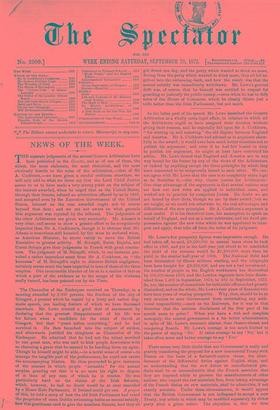Mr. Lowe's few prosperity figures were impressive enough. He had
taken off, he said, £9,000,000 in annual taxes since he took office in 1868, and yet in the half-year just about to be concluded the yield of the revenue would be £1,200,000 more than its yield in the similar half-year of 1868. The National Debt had been diminished by fifteen millions sterling, and the telegraphs have been bought for £8,650,000, and are not a bad investment; the number of people in the English workhouses has diminished by 106,000 since 1870, and the London vagrants have been dimin- ished from 1,492 in September, 1870, to 495 in September, 1872. So, too, the number of committals for indictable offences had greatly diminished, and on the whole, Mr. Lowe's four years of financial rule have been years of waxing prosperity. Why, then, should he be so very anxious to save Government from undertaking any addi- tional responsibility,—such as the Railways, for it was in that direction that the anxious disclaimers of the first part of his speech seem to point? When you have a rich and complete monopoly, the central government is a far better administrator, in spite of Mr. Lowe's economic alarms, than chance-chosen and competing Boards. Mr. Lowe's courage is too much limited to the power of saying No.' It takes courage to say 'No,' but it takes often more and better courage to say 'Yes.'


































